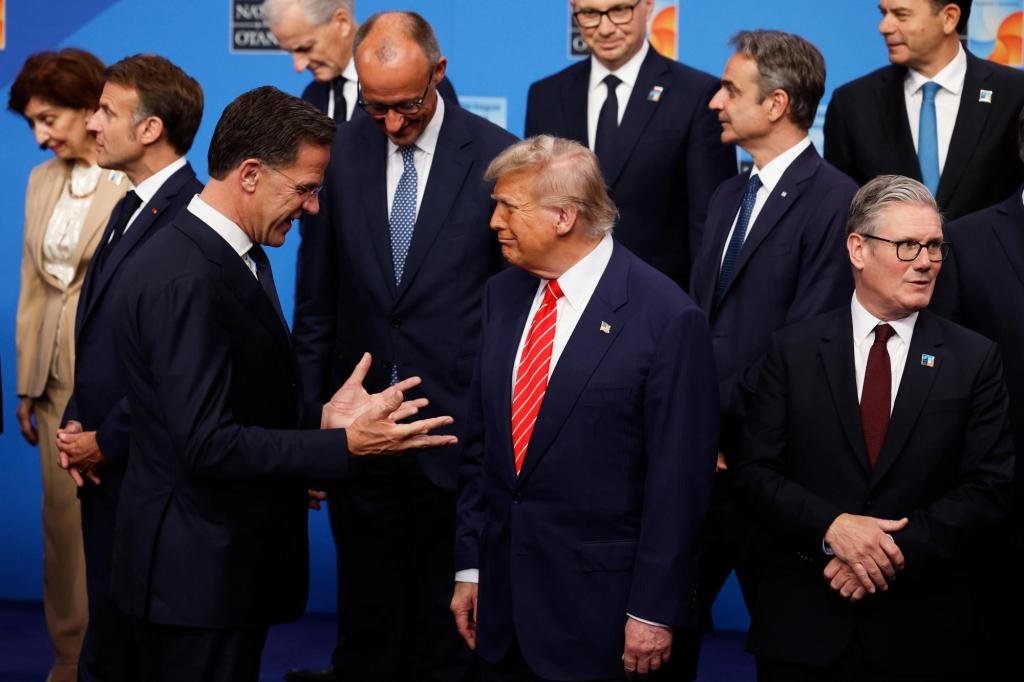Flattery and Strategy: How World Leaders Navigate Trump’s Geopolitical Theatre
As the sun dipped below the horizon in The Hague, leaders gathered for a NATO summit that felt more like a theatrical performance than a diplomatic gathering. President Donald Trump, waving to the crowd with an air of unbending authority, appeared to revel in the attention. Outside the gilded halls of diplomacy, foreign leaders stood ready, anticipating his whims and responding with the choreography of flattery and evasive strategy. With each handshake and exchange, it became evident: managing Trump is an intricate dance that few have mastered.
Learning from Experience: A Changed Landscape
In the years following Trump’s turbulent first term, a new playbook emerged for world leaders. As governments recalibrate their approaches to an unpredictable ally, they draw on a collective memory that is both strategic and cautious. The “Trump management” techniques, as they are now referred to, include:
- Suppressing contentious topics.
- Utilizing superlative praise to engage his ego.
- Adapting to the rapid-fire shifts in his policy direction.
According to a recent study published by the International Relations Institute, nearly 72% of diplomats believe that understanding Trump’s psychological profile has become essential for effective international relations. “Foreign leaders have realized that they need to play to Trump’s strengths, which often revolve around personal esteem rather than ideological cohesion,” explained Dr. Laura Byers, a leading political psychologist.
Praise as a Tool
The summit’s streamlined agenda, focusing primarily on increased defense spending, was a calculated attempt to foster goodwill. Canadian Prime Minister Mark Carney set the tone with a carefully crafted introduction that praised Trump’s leadership—a tactic that paid off in subsequent discussions. “Donald responds to admiration; it triggers a sense of validation,” noted Geoffrey Langston, a former U.S. diplomat. “It’s all about finding common ground, even when that ground is shaky.”
U.S. Foreign Policy Under Trump: A Game of Whimsy
As Trump entered the chamber, he bore the weight of a shifting global landscape. With key topics like the Ukraine war intentionally sidelined, the summit transformed into a showcase for America’s enduring dominance in NATO. Yet, the underlying tensions were palpable. Trump’s unpredictable behavior loomed large, evidenced by sudden threats of tariffs on Spain and backdoor negotiations with Israel.
“Every statement he makes is like a smoke signal for where his attention lies,” said Dr. Hugh Morrison, an analyst with the Global Policy Institute. “Diplomats have learned to decipher his intentions between the lines of his tweets.” Given this unpredictable backdrop, leaders now employ a dual strategy of preparedness and patience. Waiting out threats and teasing out Trump’s true desires has become the new normal.
Spotting the Patterns: A Predictable Dance
The choreography of praise and strategy plays out repeatedly. Rutte’s pre-summit message to Trump—predicting “BIG success” at the meeting—was both a nod to the president’s ego and a recognition of the delicate balance required to maintain diplomatic ties. Observers note that this technique mirrors past successful engagements, especially with allies like Israel and Japan, where leaders have long treated Trump as a volatile partner needing affirmation.
The Response: Success or Something More?
As the dust settled from the NATO summit, outcomes were assessed through a lens of what was avoided as much as what was achieved. “This summit was primarily about damage control,” remarked Fiona Hill, a former national security adviser. “The fact that NATO didn’t fall apart is a significant success in itself.” Leaders left the room aware that while Trump had been engaged, substantial issues remained unaddressed.
Post-summit, social media reacted with both humor and indignation; memes circulated depicting NATO as the “North Atlantic Trump Organization,” a tongue-in-cheek acknowledgment of the unusual power dynamics at play. Yet beneath the levity, the implications were sobering: world leaders must navigate a strategy that respects Trump’s whims while also securing their national interests.
Enduring Challenges
Amidst these diplomatic tightropes, questions loom large about the long-term effects of Trump’s era on international alliances. Rutte’s flattering remarks to Trump ignited debate, with some critics suggesting that such tactics reduce Europe to a position of subservience. Former Lithuanian Foreign Minister Gabrielius Landsbergis remarked, “We must strive for a balance. Flattery can quickly morph into weakness.”
This highlights a broader dilemma: how to engage an American president who fundamentally reshapes alliances with personal preferences rather than policies. Each international gathering becomes not just a meeting of minds but a stage for a carefully orchestrated performance.
The balancing act of diplomacy persists, even as Trump’s approaches continue to metamorphose. As the sun dipped below the horizon on the final day of the summit, foreign leaders departed, armed not just with achievements or agreements, but with an indispensable understanding: in the age of Trump, the art of diplomacy has been reframed into an intricate play of flattery, strategy, and unyielding resilience.





